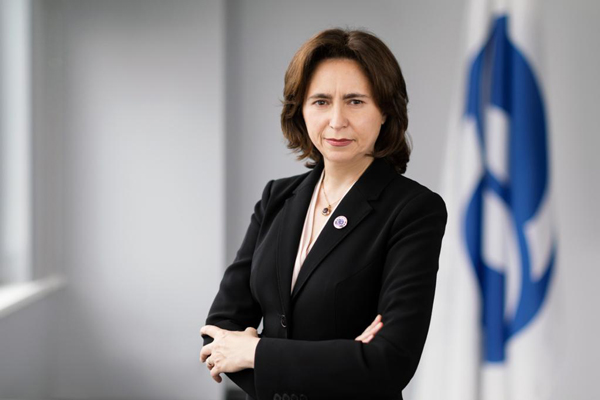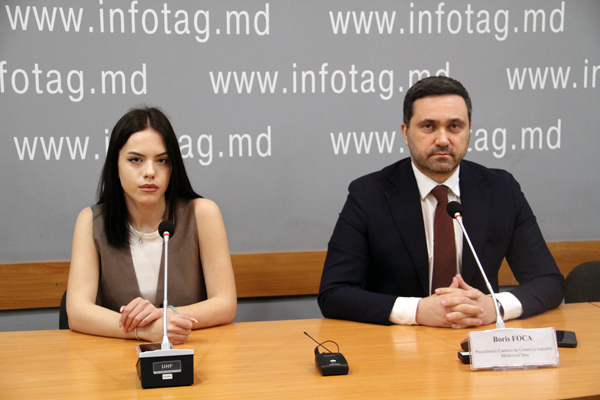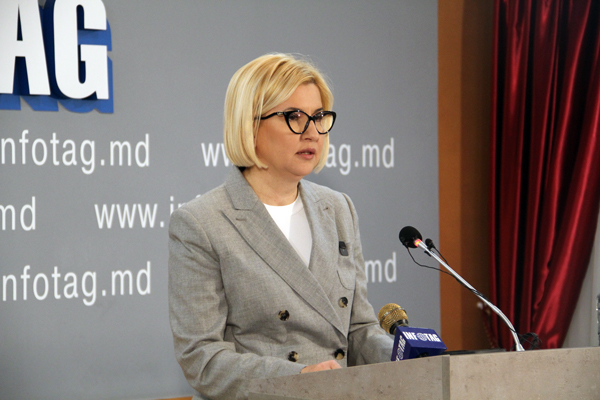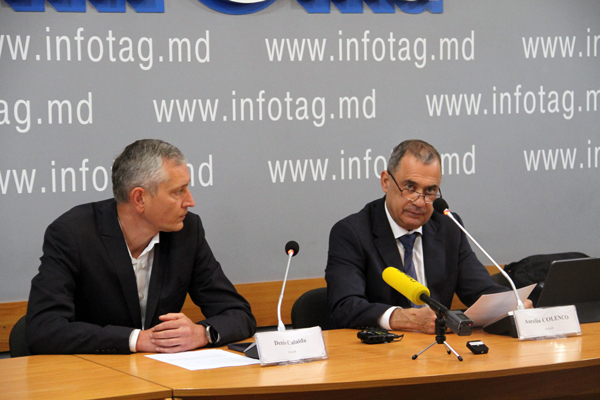Interview
ANGELA SAX: GOVERNMENT'S ACTIONS SPEAK LOUDER THAN ANY WORDS CAN

Interview given by the head of the EBRD office in Moldova, Angela Sax, to INFOTAG's correspondent Margareta Mocreac
INFOTAG: Mrs Sax, what is the importance of the record €525 million delivery that the EBRD made to Moldova in 2022? The investment increased five-fold compared with 2021 figures.
A.S.: Yes, indeed, the EBRD had an absolute record delivery in Moldova in 2022 - €525 million which was invested in 14 separate projects. You noticed correctly that our investments last year increased five-fold from general average EBRD annual investments in Moldova and in comparison with the 2021 figures when it stood at €106 million.
Our 2022 investments included the largest single project that we have ever done in Moldova - the €300 million gas supply diversification without which we would not be where we are today in terms of energy security.
We are very happy that we could do that!
Of the total sum of €525 million, the €100 million went to the road rehabilitation programme.
How has the Moldovan economy benefited from this?
Gas supply diversification project has by far the biggest impact on the country's energy security, the economy and its people. I think that this project reached each Moldovan in its own way. Not everyone knows how it happened but we are so proud that we could help because we know that it touches each Moldovan household as it helped to keep uninterrupted energy flow during the crisis.
In the past, EBRD's average investments in Moldova were up to €100 million a year because that was the demand of the economy. Last year’s record delivery was very much a crisis response as where the Bank stepped up its support significantly to meet the demands on the ground. The flexibility of the EBRD is that we could actually respond very fast and that is what we did.
Another very important element is that last year, for the first time in Moldova, the EBRD invested €125m in the private sector, including €80 million in the banking sector. Normally, we would be investing about €30-40 million in the banking sector in the past.
INFOTAG: Has any country the size of Moldova benefitted from similar EBRD investments last year?
A.S.: Relative to country size, not, as far as I know. However, Romania also benefited from a record investment of €709 million since 2009, the Baltic States investments were also at a record of €358 million and we had similar good results in other countries of operations too. Overall, Bank’s total investment in 2022 was at a record of €13.1 billion in 431 projects in 36 economies.
INFOTAG: Could you please give us more details about the €300 million invested in the gas supply diversification?
A.S.: The money was contracted in July and it is now fully disbursed. Moldova has purchased gas for €300 million. Some of the gas is stored in Ukraine and some in Romania.
This is a three year revolving facility. It means that, for three years, Moldova, through Energocom, can buy gas on international markets, sell it to consumers who pay back and then use that money to buy gas again.
Under the standard sovereign terms and conditions of the Bank the variable interest is based on Euribor+1%, which is the same for all sovereign lending across the Bank’s countries of operation, including Moldova.
It is the same interest rate as for the money given for road rehabilitation or railway rehabilitation but the terms of the use are different.
Every year there will be monitoring of the benchmarks and the use of funds, after which the money can be used for the next year.
As usual, there were some reform elements attached to this type of EBRD loan. One of them was the restructuring of the state-owned Energocom company, which is implementing the gas supply project, and here I would like to stress that the authorities have done their part of the job very well. With the help of this project and with USAID support, Energocom has managed to improve its processes and has now become a credible trader in the gas market which is a fantastic development for Moldova.
INFOTAG: Yet, the opposition has questioned the transparency of these gas acquisitions given the fact that the traders and the price were not made public. As the institution which lent the funds, is the EBRD supervising the process? What measures is it taking to ensure the transparency and correctness of the process?
A.S.: Whatever the EBRD finances in public sector it has to be implemented according to the bank's Public Procurement Practices and Rules. If these procurement rules are not applied then we can hardly finance the project.
We normally go through the whole process together with the borrower to make sure that all the rules are complied with and only after that we pay the money to the supplier. So, every single contract was reviewed by the EBRD before the money went out!
The gas has been acquired from a number of prequalified traders and this prequalification, as well, has been done in compliance with the EBRD Public Procurement Practices and Rules.
INFOTAG: You mentioned the €100 million that the EBRD lent to Moldova to rehabilitate roads. At what stage is the rehabilitation process? Is everything going according to the plan or, as it has often been the case, there are delays.
A.S.: First of all, these €100 million was a top up to an already existing road rehabilitation project because of the situation created by economic, energy and war circumstances. Everyone knows that the cost of the materials has dramatically increased last year, so, the EBRD responded to the situation.
These funds will be used to rehabilitate a 40.5km road linking Soroca with Arionesti and then the Ukrainian border. We are now at the procurement stage. The contractor will be known as a result of this process. It could be either a local or a foreign company. Any company which can comply with the rules of procurement, has experience in road construction and the ability to complete projects within the stated period of time can potentially win the contract. So far, the process is going well. And we are monitoring to make sure that it is on track.
Monitoring is actually a very serious part of our work. As you know, for many years there has been a legacy of low implementation rate. This has improved a lot recently.
Actually, there has been a lot of progress on many road construction projects recently. We have opened at least two road sections which were historically going through difficult implementation with low rate of disbursement. We are glad these funds are now in the economy of Moldova. Our disbursement rate for public projects has, in fact, doubled since 2021. And last year it increased as compared to the previous year. This is a very good indication that things are progressing.
INFOTAG: The third part of the funds disbursed by the EBRD last year went to the real sector of the economy, in particular the banking sector. What are the banks that benefited from these funds?
A.S.: A €35 million credit line went to Moldova’s largest bank, maib, for on-lending to small and medium-sized enterprises (SMEs). We also supported OTP and Eximbank.
INFOTAG: What are the EBRD's upcoming plans and projects for Moldova?
A.S.: We are in early February but we have already signed one very important project - the first national-scale solid waste management project that will be benefitting three municipalities - Ungheni, Calarasi and Nisporeni.
I am very proud that this has already happened as this was one of the biggest plans we had to sign this year. The project has to do with an EU standards compliant landfill construction and acquisition of equipment for the collection of waste plus other related investments.
This year, we will, of course, continue to support the banking sector so that the banks can reach out to the SMEs which remain the backbone of this economy.
We also have some infrastructure projects which are in discussion with the government but it is very early to say which one will come to fruition.
Of course, we are not looking into a €525 million investment in 2023, but, to be clear, if the needs are as high as that, Moldova can rely on EBRD support!
INFOTAG: You mentioned the EBRD's investment in the solid waste management project this year. In this context, if the government asked for an investment in a waste recycling plant, something Moldova does not have yet but needs badly, would the EBRD agree to finance it?
A.S.: In order to build a waste processing plant, first the waste collection needs to be improved, including its sorting. As you rightly noted there are currently many dumpsites all over the country. Our project assumes the closure of some 100 of small dumpsites and two relatively larger ones. In our experience, recycling facilities can be profitable and can be financed by the private sector, once the government improves the fundamental conditions of solid waste management including.
INFOTAG: In 2021, the EBRD offered Moldova a €23.5 million loan to continue the modernization of the Moldovan Railways Company. What exactly is this money being used for? Are the works going on according to the plan?
A.S.: The funds are being used to rehabilitate the railway section Bender-Causeni-Basarabeasca-Etulia-Giurgiulesti. The works are performed by a Kazakh company, Temirzhol Zhondeu, which won the tender as it offered the lowest price. Up until now, the works are going on as planned. They are expected to be finished by mid-2024.
INFOTAG: How would you describe the EBRD's cooperation with the Moldovan government? How responsive is the government to EBRD suggestions?
A.S.: First of all, I would like to mention that we are happy and proud that we have a trustful working relationship with the government and the authorities overall.
In fact, our record delivery of last year would not have been possible if there was no responsiveness on the part of the authorities. A lot of novelties and new processes had to be handled and everything was done very well. We are not in a position to either criticise or praise.All I can say is stating the obvious: Moldova benefited from all this support because Moldova stood up to the challenge.
We are also very pleased to have engaged in a very constructive policy dialogue. Together with the authorities, plans were drawn around Energocom becoming a trader. As I have already said, now this company is a full-fledged player in the market, so this is the case when actions speak louder than any words can.
I would also like to mention that, at the request of the government, the EBRD will implement a pilot programme under which 20 local expertswill be imbedded in critical ministries and agencies to help with some of the reforms, including in the transport, energy and state-owned enterprises sectors.
We hope we can really contribute to the government's efforts to bring Moldova closer to the EU. By the way, congratulations on the EU candidate status that Moldova was granted in 2022. We were all very excited about that and we will do our best to help the country get there.
Moldova needs to grasp the European integration opportunity and I really hope that people will agree that this is where the future of their country lies and will help the government to take the country forward. Many people may think that not enough has been done by the authorities but they also have to understand that no one knew there was going to be a war or a refugee crisis coupled with a severe energy crisis. How the government is managing to keep this country afloat during these challenges, is just commendable.
























Add Comment